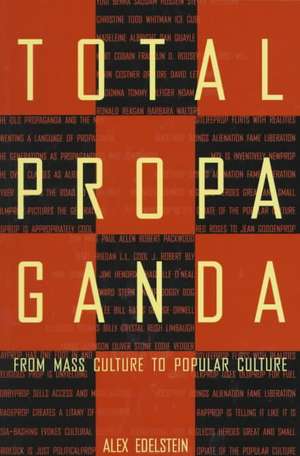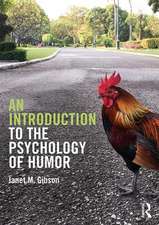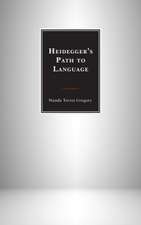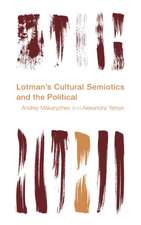Total Propaganda: From Mass Culture To Popular Culture: Routledge Communication Series
Autor Alex S. Edelsteinen Limba Engleză Paperback – mai 1997
To emphasize the necessity for new thinking about propaganda, Edelstein creates the concepts of the new propaganda and the old, and he devises a language of "uninyms" to convey their meanings more quickly. "Oldprop" is characteristic of mass cultures and utilizes totalitarian methods of conflict, hegemony, minimization, demonization, and exclusiveness to achieve its goals. By contrast, "newprop" is created by members of the popular culture to allow them to engage in accomodation, enhance the individual, and promote inclusiveness. Shifts in the old and the new propaganda are tracked across social issues such as race, religion, sexuality, gender, gun control, and the environment, as well as in fashion, politics, advertising, sports, media, and politics.
Central to the concept of total propaganda is that it is not simply additive; it is the product of new energies that are produced by the fusing of propaganda in such related forums as music, art, advertising, sports and politics. It is these synergies, and their production of new energies, that make total propaganda greater than the sum of its parts.
Edelstein concludes that the most important distinction that should be drawn between mass culture and popular culture is its text; i.e., its propaganda. In a popular culture, everyone creates and consumes propaganda; in a mass culture almost everyone consumes it but only a few create it. This formulation offers new ways to discuss power and ideology in media texts. As an example, where once the least informed and the least educated were the most subject to propaganda, now the most informed and most educated often are the first to create propaganda and the first to consume it.
| Toate formatele și edițiile | Preț | Express |
|---|---|---|
| Paperback (1) | 424.75 lei 3-5 săpt. | +20.04 lei 7-13 zile |
| Taylor & Francis – mai 1997 | 424.75 lei 3-5 săpt. | +20.04 lei 7-13 zile |
| Hardback (1) | 1011.82 lei 6-8 săpt. | |
| Taylor & Francis – mai 1997 | 1011.82 lei 6-8 săpt. |
Din seria Routledge Communication Series
-
 Preț: 156.78 lei
Preț: 156.78 lei - 9%
 Preț: 575.54 lei
Preț: 575.54 lei -
 Preț: 155.43 lei
Preț: 155.43 lei - 8%
 Preț: 441.77 lei
Preț: 441.77 lei - 8%
 Preț: 415.39 lei
Preț: 415.39 lei - 9%
 Preț: 576.43 lei
Preț: 576.43 lei - 15%
 Preț: 404.22 lei
Preț: 404.22 lei - 8%
 Preț: 495.22 lei
Preț: 495.22 lei - 8%
 Preț: 509.90 lei
Preț: 509.90 lei -
 Preț: 392.96 lei
Preț: 392.96 lei - 8%
 Preț: 516.77 lei
Preț: 516.77 lei - 8%
 Preț: 460.12 lei
Preț: 460.12 lei - 8%
 Preț: 394.36 lei
Preț: 394.36 lei - 15%
 Preț: 431.10 lei
Preț: 431.10 lei -
 Preț: 364.94 lei
Preț: 364.94 lei -
 Preț: 363.96 lei
Preț: 363.96 lei - 22%
 Preț: 325.34 lei
Preț: 325.34 lei - 15%
 Preț: 463.49 lei
Preț: 463.49 lei - 15%
 Preț: 464.31 lei
Preț: 464.31 lei -
 Preț: 366.85 lei
Preț: 366.85 lei -
 Preț: 264.53 lei
Preț: 264.53 lei - 16%
 Preț: 247.75 lei
Preț: 247.75 lei -
 Preț: 354.28 lei
Preț: 354.28 lei -
 Preț: 374.27 lei
Preț: 374.27 lei - 22%
 Preț: 321.54 lei
Preț: 321.54 lei -
 Preț: 418.13 lei
Preț: 418.13 lei -
 Preț: 481.52 lei
Preț: 481.52 lei -
 Preț: 442.50 lei
Preț: 442.50 lei -
 Preț: 498.91 lei
Preț: 498.91 lei -
 Preț: 369.95 lei
Preț: 369.95 lei - 24%
 Preț: 133.28 lei
Preț: 133.28 lei - 31%
 Preț: 325.43 lei
Preț: 325.43 lei - 25%
 Preț: 769.37 lei
Preț: 769.37 lei -
 Preț: 447.05 lei
Preț: 447.05 lei - 18%
 Preț: 722.88 lei
Preț: 722.88 lei -
 Preț: 389.60 lei
Preț: 389.60 lei -
 Preț: 249.75 lei
Preț: 249.75 lei -
 Preț: 395.37 lei
Preț: 395.37 lei -
 Preț: 363.96 lei
Preț: 363.96 lei - 18%
 Preț: 1004.72 lei
Preț: 1004.72 lei - 18%
 Preț: 998.71 lei
Preț: 998.71 lei -
 Preț: 380.22 lei
Preț: 380.22 lei - 26%
 Preț: 243.26 lei
Preț: 243.26 lei -
 Preț: 97.53 lei
Preț: 97.53 lei -
 Preț: 242.11 lei
Preț: 242.11 lei - 20%
 Preț: 402.68 lei
Preț: 402.68 lei -
 Preț: 226.33 lei
Preț: 226.33 lei -
 Preț: 386.14 lei
Preț: 386.14 lei -
 Preț: 241.09 lei
Preț: 241.09 lei
Preț: 424.75 lei
Nou
Puncte Express: 637
Preț estimativ în valută:
81.27€ • 84.86$ • 67.27£
81.27€ • 84.86$ • 67.27£
Carte disponibilă
Livrare economică 14-28 martie
Livrare express 28 februarie-06 martie pentru 30.03 lei
Preluare comenzi: 021 569.72.76
Specificații
ISBN-13: 9780805808926
ISBN-10: 0805808922
Pagini: 362
Dimensiuni: 152 x 229 x 23 mm
Greutate: 0.39 kg
Ediția:1
Editura: Taylor & Francis
Colecția Routledge
Seria Routledge Communication Series
Locul publicării:Oxford, United Kingdom
ISBN-10: 0805808922
Pagini: 362
Dimensiuni: 152 x 229 x 23 mm
Greutate: 0.39 kg
Ediția:1
Editura: Taylor & Francis
Colecția Routledge
Seria Routledge Communication Series
Locul publicării:Oxford, United Kingdom
Public țintă
ProfessionalCuprins
Contents: K.E. Heintz-Knowles, Foreword: Popular Culture and the New Propaganda. Part I:Framing Totalprop: The Old Propaganda and the New. Totalprop: From Mass Culture to Popular Culture, the Old Propaganda and the New. Definitionprop: Distinguishing the Old Propaganda From the New. Languageprop: Inventing the Uninym. Multiprop: Generation and Class. Cyberprop: The Path to Totalprop. Part II:Entertainmentprop: Surprisingly Newprop. Filmprop: Picturing the Generations. Adprop: Appropriately Cool! Sitlifeprop: Flirting With Realities. MTVprop: Inventively Newprop. RockProp: Alienation, Fame, and Liberation. Rapprop: Telling It Like It Is. Sportsprop: Businessball and Heroes Great and Small. Humorprop: Opiate of the Popular Culture. Part III:Mediaprop: From Broadcasting to Journalistic Nirvanas. Radio Talkprop: Using Oldprop for Fuel. TVprop: From Talk to Infotainment. Mediaprop: Shooting the TV Messenger. Journalismprop: Searching for Nirvanas. Part IV:Socialprop: Issues Seeking Answers. Gayprop: One Foot In, One Out. Genderprop: Women in Mid-Passage. Trinityprop: Race, Abortion, and Religion. Lobbyprop: The NRA and the Environment. Part V:Tradeprop and Politicalprop: The Production of Lexicons. Tradeprop: "Naftoids" and a Vision of GATT. Asia-Bashing, A Cultural Oldprop. Politicalprop 1992: Gridlock and Credibility. Politicalprop 1994 and 1995: Restoring Presidentialprop. The 1996 Campaign: Softprop and Hardprop. Pollprop: Court of Last Resort. Endprop: The Road Ahead.
Recenzii
"Total Propaganda offers the reader a nearly total look at U.S. popular culture in the 1990s. Total Propaganda merits the attention of those involved in public relations education."
—Public Relations Review
"...the book makes fascinating reading mainly because of the author's imaginative and thoughtful references to entertainment, media and some critical social issues, and actors....will offer a pleasant challenge to those who are willing to stretch their definitional horizons and share Edelstein's view that propaganda in our time and place is as ubiquitous as culture."
—Journalism & Mass Communication Quarterly
USE FIRST THREE TESTIMONIALS ONLY FOR GENERAL CATALOGS... "A most engaging commentator on public affairs television, Professor Edelstein brings that same quality of mind to the analysis of Total Propaganda."
—Barry Mitzman
Director of Public Affairs, KCTS (9), Seattle
"...offers internationalists who are caught up in the old propagandas of war and conflict fresh approaches to new propagandas in modern states."
—Robert L. Stevenson
University of North Carolina
"The always inventive author provides a cornucopia of ideas and insights about politics and communication as he deconstructs the old propaganda paradigm and illuminates the new."
—David Paletz
Duke University
"Political scientists and Asia specialists will appreciate the creative approach to the analysis of propaganda with respect to trade and politics."
—Alan P.L. Liu
California, Santa Barbara
"Total Propaganda is for students and about them. My students are excited about the concept of the new propaganda."
—Diana S. Tillinghast
San Jose State University
"The author's distinction between the old and the new propagandas redirects us to old and new forms of media criticism and old and new media effects."
—Steve Chaffee
Stanford University
"The conceptual distinction between the old and the new propaganda gives us much to think about and is worthy of empirical exploration."
—Lee B. Becker
The Ohio State University
"A fresh, creative, and original look at politics, popular culture, and propaganda. Important reading for the end of this century and the beginning of the next."
—Chuck Whitney
University of Texas
"...pushes out the boundaries of the study of propaganda in the popular culture in understandable, creative, and contemporary ways."
—Garth Jowett
Houston University
"Total Propaganda offers us a fresh and intriguing mix of the new propaganda, politics, and the media."
—W. Lance Bennett
University of Washington
—Public Relations Review
"...the book makes fascinating reading mainly because of the author's imaginative and thoughtful references to entertainment, media and some critical social issues, and actors....will offer a pleasant challenge to those who are willing to stretch their definitional horizons and share Edelstein's view that propaganda in our time and place is as ubiquitous as culture."
—Journalism & Mass Communication Quarterly
USE FIRST THREE TESTIMONIALS ONLY FOR GENERAL CATALOGS... "A most engaging commentator on public affairs television, Professor Edelstein brings that same quality of mind to the analysis of Total Propaganda."
—Barry Mitzman
Director of Public Affairs, KCTS (9), Seattle
"...offers internationalists who are caught up in the old propagandas of war and conflict fresh approaches to new propagandas in modern states."
—Robert L. Stevenson
University of North Carolina
"The always inventive author provides a cornucopia of ideas and insights about politics and communication as he deconstructs the old propaganda paradigm and illuminates the new."
—David Paletz
Duke University
"Political scientists and Asia specialists will appreciate the creative approach to the analysis of propaganda with respect to trade and politics."
—Alan P.L. Liu
California, Santa Barbara
"Total Propaganda is for students and about them. My students are excited about the concept of the new propaganda."
—Diana S. Tillinghast
San Jose State University
"The author's distinction between the old and the new propagandas redirects us to old and new forms of media criticism and old and new media effects."
—Steve Chaffee
Stanford University
"The conceptual distinction between the old and the new propaganda gives us much to think about and is worthy of empirical exploration."
—Lee B. Becker
The Ohio State University
"A fresh, creative, and original look at politics, popular culture, and propaganda. Important reading for the end of this century and the beginning of the next."
—Chuck Whitney
University of Texas
"...pushes out the boundaries of the study of propaganda in the popular culture in understandable, creative, and contemporary ways."
—Garth Jowett
Houston University
"Total Propaganda offers us a fresh and intriguing mix of the new propaganda, politics, and the media."
—W. Lance Bennett
University of Washington





















